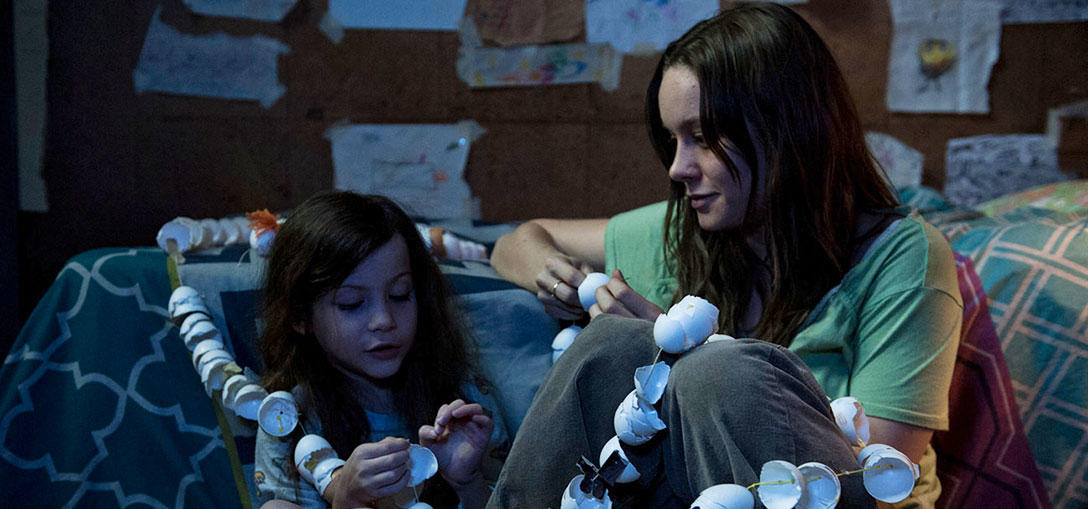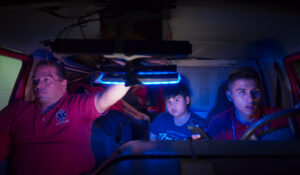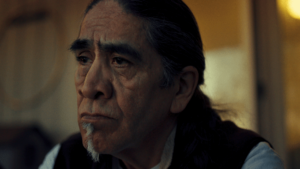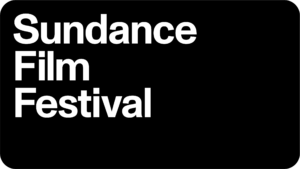“Room” © 2015 A24
Sundance Institute
At age 6, Brie Larson told her mother she wanted to be an actress. Twenty years later, Larson gleams in the Hollywood spotlight for her critically acclaimed performance in the gripping drama Room, which has earned her an Oscar Best Actress nomination. Early in her career—long before this award-buzzy role in which Larson plays a resilient mother held prisoner in a tiny shed with her son—the actress learned to say no to roles that did not personally speak to her.
Through her discerning “yeses,” she’s built up a dynamic body of work. From indie favorites like The Spectacular Now and Short Term 12, to blockbuster hits like 21 Jump Street and Trainwreck, Larson has weaved what she affectionately calls a “tapestry of weird.” Larson recently spoke with Sundance Film Festival Director John Cooper about the contradictions and complications, the bliss and epiphanies of navigating a pathway of creativity.
You have such an interesting career path. It seemed like you just had drive from a very early age.
Yeah, it’s weird because my interest in film and in acting is [from] before I had real solidified memories. So it seems like it’s been this bizarre guiding force in my life since before I can even remember. I was a super-shy kid—painfully shy—and had a really hard time talking with other kids in the class. If my parents had friends over, I would hide in my bedroom.
At 6, I told my mom that I’m supposed to be an actor. She thought that I must be just repeating something I had heard on TV, because there was just no way that this child wanted to do that. So she kind of laughed it off at first. And she was encouraging me to do all sorts of other artistic ventures that I was also interested in, like drawing. And I became really interested in that.
And I did a storyboard for all of Lion King. It was like 300 pages long. I don’t really know what I was thinking, because obviously Lion King had already been made. They didn’t need me to make stick-drawing storyboards. But I made one, and I didn’t tell my mom that I was making it because I knew we had an upcoming trip to Disney World. And when we got to visit the animators’ section at Disney World, I asked her if she had brought my storyboards.
That was, I think, when she knew that I was a weird combination of artistic and perfectionist, which can work really well or it can work against you, depending on your ability to let go of that perfection and control. So because I wouldn’t stop talking about acting, she said if I took acting lessons once a week for a year that she would think about getting me an agent. By the time that year had expired, I was doing monologues and performing in the local theater company and was doing these performances every night in plays. But still, if my parents had friends over, I still would hide in my bedroom. So it was an odd dichotomy of being really comfortable with a large group of people and a performance setting but being very shy when it came to one-on-one social interactions.
And once you made it out of your bedroom, you’ve bounced so much between television, independent film and then sort of blockbuster at the same time. Is that just following your nose through that or did you have some divine plan?
I think it’s a little bit of both. I realized early on that the only power that I had was to say no. And I got very comfortable with saying no. I just didn’t want to do things that didn’t feel real to me. There were certain things that I knew I definitely didn’t want to do. I didn’t always know what I wanted, but I knew what I didn’t want. So my agent and manager have joked that I have used the word “no” far before I was technically allowed to.
There’s this idea that you’ve just got to take what you get. And I never believed in that, so it actually took me a whole lot longer, I think, to get to where I am because I didn’t just try and slap my face on everything possible. But I was always very pointed in what it was I wanted to do. I know that I’m not a good actor unless I believe in it. So it meant that part of it was that I would say no to things. The other part of it is I think as an artist you get the parts that you’re supposed to get and you meet the people and collaborate with the people you are like-minded with. So because of who I am, I think it created a very complicated and dynamic body of work that’s not just one thing. It’s not a niche. It’s more like a tapestry of weird.
Tapestry of weird—that’s the name of your book.
Something for a memoir.
What makes you want to say yes? Is it meeting the creator, like a director? Is that what it is? Or is it the script or the character?
It takes many yeses in order to fully dive into a project. And first and foremost it’s the script and how it reads, how dynamic the characters are. I’m really interested in showing contradiction and complication. I don’t think anybody is any one thing. So you know pretty well off the bat: If you’re dealing with a script that’s filled with clichés, that’s maybe not something that’s for me. And whatever is happening underneath the storyline. I think all of the great movies have deeper roots in them than what’s on the surface.
There’s the satisfying aspect of just watching the movie in the theater and playing and following the storyline. And then there are the things that are sort of underneath that linger with you after you walk out of the theater and keep you thinking about the movie for days, or weeks, or years, or for the rest of your life, hopefully. And then it’s meeting the director, seeing what kind of process they want to work with, and how they want to go down that pathway of creativity, and if it feels like that is a relationship that is going to work well; you want a different leader depending on what kind of role it is and what kind of movie it is. And I like to keep things different and keep myself always off balance.
Was there ever a part that you regretted turning down? Is there some part that you’d like to talk about that you didn’t do that you thought about later?
There’s a lot of roles that I was very devastated that I didn’t get—not that I turned down, but that I was rejected from—that at the time just felt like brought me to my knees and made me feel like I didn’t know if I wanted to be an actor anymore or if this was my path. But then by the time the movie has come out, I’ve always felt really at peace about it. It’s a weird thing … I [noticed] that I would pass on things because I was reading a script and I was creating the movie in my mind. And then I would reject or accept whatever imaginary hypothetical film I had made, that I was the director, the editor and making the soundtrack of.
So I had to put aside all of my own hypotheticals and jumping to conclusions based upon how I would make a movie based off the script and instead deal with what’s on the ground. So usually if you go down the process of being really honest with yourself and not just reading the script but working with the director, feeling the vibe of all the people that are around you, instead of just inserting yourself and forcing a creative process to happen, you really find the places that you’re supposed to be.
And so I would say 100 percent of the time that there has been a job that I didn’t get, whenever I look at the film afterwards, I go, “Oh, I didn’t get it because it’s not the movie that I had in my head. I wasn’t the right person for it.” I thought I was the right person because of the movie I created, but that’s not what was actually being made.
It almost sounds like you’re a director in some ways. Do you think about that?
Oh, yeah. That’s where I’m headed. The short that I did that got into Sundance, I had never even watched a short film before. I didn’t know what I was doing at all. We made that short for $800 with just our friends and family. My stepdad was doing the sound, and my sister, who has never acted before, was the lead. It was a labor of love of friends and family. And it was just the act of doing.
I did it with two of my best girlfriends. I was the only one who was 21, so technically the other two weren’t even allowed to get into the award ceremony. We were doing it just to do it. And I almost didn’t even submit it to Sundance because I’d never had a film that had gotten in either. I’d never been to a film festival before. So I didn’t know what a short film looked like, if ours was any good. And the only reason why I got in was because my agent insisted. I think it’s a $75 fee to submit, and he was like, “I will pay the $75, just try.” And just getting in was an amazing moment. We were like, “No way!” And then when we won, it was the most incredible feeling in my life.
I don’t think I’ve ever been more proud of anything or more out-of-my-mind excited than winning that award, because that was something I created completely from the ground up. I mean, we did the hair, we did the makeup, we did all the sets. We did everything connected to that movie. So it was really exciting. And then I did another short after that, I guess a year later, that I’m also really proud of. And that premiered at South by Southwest the same year as Short Term 12 premiered. And it’s just always felt like those are the two sides of me.
But it’s the difference between being the driver and being the passenger. Sometimes you really just want someone else to drive and other times you want to be the one that has the steering wheel in their hands. So having both as something that is available to me is so important. And I’m developing a feature right now. I plan to take time and shoot it by the end of next year. It may be lofty, but I’m shooting for it.

I have two big questions about Room, because it seems like such an important moment in your career. Did you know going into this project that it would have such impact? Did you feel it from the beginning?
No, no. Well, it’s confusing to be in my position while you’re in the mix of the creative process, because you have no perspective of how it looks from the outside. There is so much more footage than what it gets refined to. I don’t think you can have a sense that you’ve figured it out, because once you’ve figured it out, then you’re kind of missing that friction of searching and trying to find it and keeping yourself on your toes.
And you have the added viewpoint of playing a character who is really going through something very dark and traumatic and so your world is sort of colored and you’re seeing everything through their eyes. It felt the same way with Short Term 12. I did not realize how funny Short Term 12 was until I watched it, because my character [Grace] was going through so much and taking things so seriously that she couldn’t see any of the humor in the world.
So it wasn’t until I was able to step back and view the movie as an audience member through Brie’s eyes and not through Grace’s eyes that I was able to make sense of it. It was the same thing with Room. The whole time we were making it, all I was trying to do was keep that boy safe and make sure that his every moment was comfortable and that he was happy and that we were moving forward and trying to keep all the pieces together.
You almost answered my second question, which was did you approach this film much differently? It seemed like such a different part.
Well, the main difference was just that I had time. Short Term 12 we shot in I think it was 19 days or 20 days. And I didn’t know I had the job until a month before, and I didn’t audition for it. So I didn’t really even know who she was. I didn’t have a lot of time to figure it out. And pretty much every other job I’ve had before that was the same thing. You don’t have the luxury of time. And Room was the first movie where I was cast eight months before we started shooting. So I had eight months to create her from the ground up and completely rewire my brain and change everything about myself in order to be her.
And I kept having these moments of pure bliss and epiphany through that process, where I was like, “Wow. Maybe I actually have more tools than I even realized, because I have more space to do my job. I have more colors to paint with than I previously had.” That’s what I think is what’s different about this. It’s the first time that I’ve had time, had time to really craft something. It’s the difference between building a cabinet or building one that has tons of carvings and beautiful detail on it. It just takes time. It takes more time. Well, yes, it’s a very beautiful cabinet indeed that you created.
Brie Larson first took part in the Sundance Film Festival in 2012 as a director, writer, actor, and producer with the short film, The Arm. Honored with a Special Jury Award for Comedic Storytelling, The Arm follows the misconceptions of a young relationship formed through texting. As an actor, Larson appeared in Festival films including James Ponsoldt’s The Spectacular Now (2013), Joseph Gordon Levitt’s Don Jon (2012), and Joe Swanberg’s Digging for Fire (2015).




